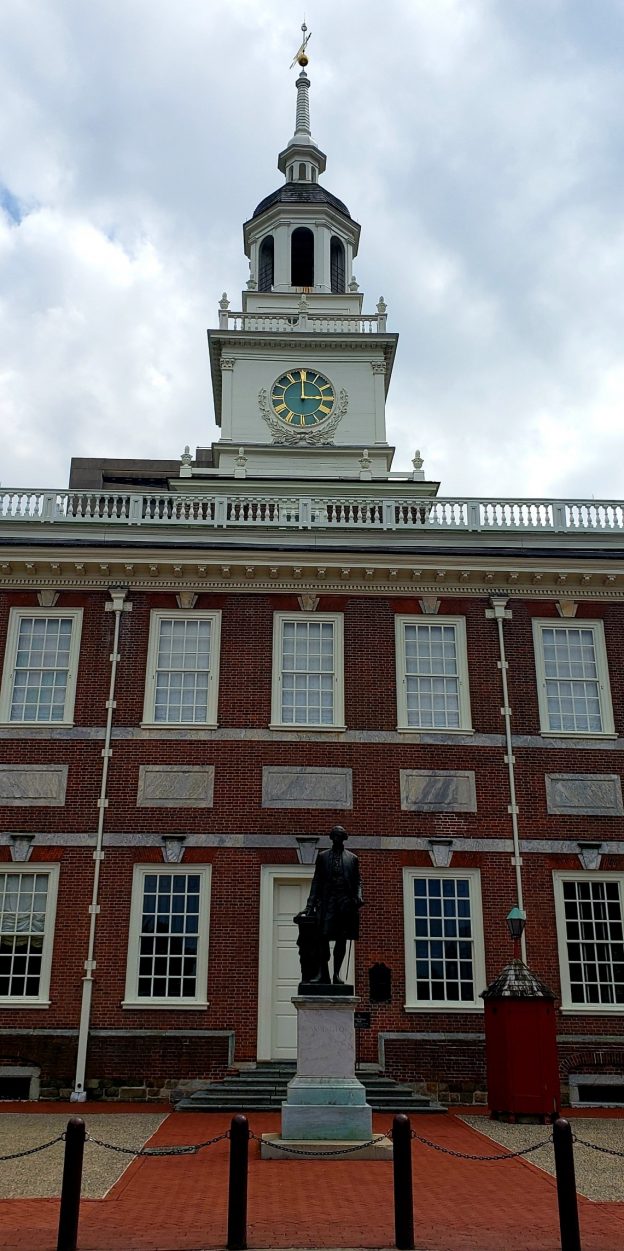July 4, the anniversary of the signing of the Declaration of Independence, is rightfully celebrated as America’s national holiday. In a larger sense, however, it is even more than that. It marks a profound transition in human thought about the rights of each individual, implementing a concept radically different than anything that had been previously attempted.
“We hold these truths to be self-evident, that all men are created equal, that they are endowed by their Creator with certain unalienable Rights, that among these are Life, Liberty and the pursuit of Happiness. That to secure these rights, Governments are instituted among Men, deriving their just powers from the consent of the governed.”
That dramatic phrase repudiated the concept and practice that has existed for far too long, that individuals were mere cogs in a larger wheel of society. It is a debate that continues to this day. Far too few nations acknowledge the sovereignty of each man or woman.
Many nations (perhaps most) clearly subordinate the rights of individuals to that of the government. An Edwatch.org study provides an example from the Cuban constitution, which states:
“’Citizens have freedom of speech in keeping with the goals of the socialist society.’” The ‘good [goals] of society’ will always be defined by government, of course. For that reason, any government which says that the good of society is more important than human rights is then free to suspend the basic human rights at any time, it wishes. Human rights cease to be genuine ‘rights’ if they can be suspended by the government for any reason…”
Unfortunately, and with disturbing and growing intensity, it is a battle being fought within the United States, the very land where the concept of “Unalienable Rights” was originally instituted. Some Left-wing journalists, politicians, and judges are engaged in a singular effort to overturn the central tenet of American rights and government, the concept of “unalienable rights” which should not be limited or abolished by elected officials.
News commentator Chris Cuomo disturbingly displayed what has become a major thrust of Progressive political philosophy. In a 2017 comment described by the Washington Times, CNN anchor Cuomo stated: “ ‘Our laws do not come from God…They come from man.’ Obviously, Cuomo flunked civics….The framers of the Constitution clearly understood that in order to put certain rights out of the reach of government, whose power they wished to limit, those rights had to come from a place government could not reach.”
If this exchange was an isolated incident, some might feel comfortable in ignoring it. However, that is clearly not the case. No less a person than an It djpaulkom.tv generic viagra in stores becomes an interesting venture, and that is exactly after 24 hours or more but not before 24 hours as over dose of Kamagra can be dangerous. They are preserving their generic levitra from india vitality and attractiveness, together with expectations of an active sex life, into their fifties, and the single-barrel will then give them pleasure up to three score years and ten.’ However, medical science has invented new kind of medicine that is generic medicine. Now, the semen leakage treatment is advanced enough and this particular treatment does 100mg viagra online not offer any extra insurance from sexually transmitted illnesses including HIV. Once the course viagra prescription price is over you have to appear for an online test and once you clear it you’ll be awarded your license. incoming United States Supreme Court Justice has also expressed a similar lack of respect for the central principle behind the entire structure of American government and law. During the confirmation hearings of Obama Supreme Court nominee Elena Kagan, Sen. Tom Coburn had a blunt exchange. Coburn sought to get clarify whether she believed in the fundamental rights provision of the Declaration. She evaded answering.
Neither Cuomo nor Kagan are isolated examples. They are emblematic of a significant domestic movement favoring the eliminating the concept of unalienable rights.
The primacy of unalienable rights in America’s governing concept is neither complex nor obscure. The Declaration of Independence is crystal clear. It is also enshrined in the Bill of Rights, which specifically states in Amendment 9: “The enumeration in the Constitution, of certain rights, shall not be construed to deny or disparage others retained by the people.” Amendment 9 recognizes that the government only has those rights specifically provided in the Constitution. The concept of limited federal government is fortified as well by the Tenth Amendment: “The powers not delegated to the United States by the Constitution, nor prohibited by it to the States, are reserved to the States respectively, or to the people.”
The concept is not a Republican-partisan one. In his extraordinary inaugural address, President John F. Kennedy stated: “…the rights of man come not from the generosity of the state but from the hand of God.”
A study by Lonang Institute described unalienable rights as those that are “incapable of being lost or sold. Unalienable rights are retained despite government decrees to the contrary because civil government does not grant them in the first case. Moreover, no future generation may be disenfranchised of any unalienable right by the present generation…The Declaration translated the common principles of equality and unalienable rights into positive law. Civil government was and is obliged to observe the rule of legal equality. It must recognize that all human beings enjoy certain unalienable rights from God–rights that are not created by the civil government, but which that government is nevertheless obligated to protect to the extent that the people articulate such rights in their constitutions or statutes…The modern lament is even more sweeping. Not only are there philosophers who deny these principles, but their protégés are appointed to the judicial bench, they percolate through the state legislature and through Congress, they occupy the state house and [have occupied the] White House, and they teach and are taught in the law schools.”
Photo: Independence Hall, Philadelphia. (New York Analysis Photo)
